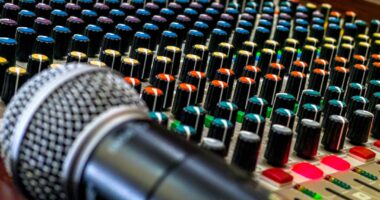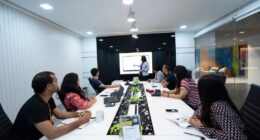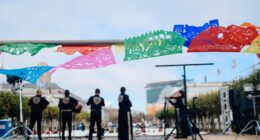In the ever-evolving landscape of the music industry, the role of a music promoter has become increasingly vital. Music promoters serve as the bridge between artists and their audiences, ensuring that the right messages reach the right people at the right time. They are responsible for organizing events, securing venues, and creating buzz around an artist’s work, which can significantly influence an artist’s career trajectory.
Without effective promotion, even the most talented musicians may struggle to gain visibility in a saturated market. The importance of a music promoter extends beyond mere event organization; they play a crucial role in shaping an artist’s public image and brand identity, which can ultimately determine their success in a competitive industry. Moreover, music promoters are adept at navigating the complexities of the industry, leveraging their networks to create opportunities for artists.
They possess a deep understanding of market trends, audience preferences, and the intricacies of event logistics. This knowledge allows them to craft tailored promotional strategies that resonate with target demographics. By analyzing data and feedback from previous events, promoters can refine their approaches, ensuring that each campaign is more effective than the last.
In essence, music promoters are not just facilitators; they are strategic partners who contribute significantly to an artist’s growth and sustainability in the music business.
Key Takeaways
- A music promoter plays a crucial role in the industry by connecting artists with opportunities and helping them reach a wider audience.
- Building strong relationships with artists and industry professionals is essential for a music promoter to succeed in the industry.
- Effective marketing strategies for music events involve understanding the target audience and utilizing various promotional channels to create buzz and excitement.
- Social media and online platforms are powerful tools for music promotion, and a music promoter should be well-versed in utilizing these platforms to reach a larger audience.
- Negotiating and securing performance opportunities for artists requires strong communication skills and a good understanding of the industry landscape.
Building Relationships with Artists and Industry Professionals
At the heart of successful music promotion lies the ability to build and maintain strong relationships with both artists and industry professionals. A music promoter must cultivate trust and rapport with artists, understanding their vision and goals while providing guidance and support throughout their careers. This relationship is often built on open communication, where promoters listen to artists’ needs and aspirations, allowing them to tailor promotional strategies that align with the artist’s brand.
By fostering a collaborative environment, promoters can help artists feel valued and understood, which can lead to more authentic and impactful promotional efforts. In addition to nurturing relationships with artists, music promoters must also engage with various industry professionals, including venue owners, booking agents, and media representatives. These connections are essential for securing performance opportunities and gaining access to valuable resources that can enhance an artist’s visibility.
By networking within the industry, promoters can create a web of support that benefits not only the artists they represent but also the broader music community. This interconnectedness fosters a sense of collaboration that can lead to innovative projects and successful events, ultimately enriching the cultural landscape.
Creating Effective Marketing Strategies for Music Events

Crafting effective marketing strategies for music events is a multifaceted endeavor that requires creativity, analytical thinking, and a deep understanding of the target audience. A successful promoter must first identify the unique selling points of an event—be it the lineup of artists, the venue’s ambiance, or special features like meet-and-greets or exclusive merchandise. Once these elements are established, promoters can develop a comprehensive marketing plan that encompasses various channels, including traditional media, digital platforms, and grassroots outreach.
This holistic approach ensures that potential attendees receive consistent messaging across multiple touchpoints, increasing the likelihood of ticket sales. Additionally, effective marketing strategies must be adaptable to changing circumstances and audience preferences. Promoters should continuously monitor engagement metrics and audience feedback to assess the effectiveness of their campaigns.
This data-driven approach allows them to pivot their strategies as needed, whether that means adjusting promotional materials or exploring new advertising channels. By remaining agile and responsive to market dynamics, music promoters can maximize their impact and ensure that each event reaches its full potential.
Utilizing Social Media and Online Platforms for Promotion
| Platform | Number of Followers | Engagement Rate |
|---|---|---|
| 10,000 | 5% | |
| 15,000 | 8% | |
| 5,000 | 3% |
In today’s digital age, social media and online platforms have revolutionized how music is promoted. These tools provide promoters with unprecedented access to audiences, allowing them to engage directly with fans and create a sense of community around an artist or event. Platforms like Instagram, Facebook, Twitter, and TikTok enable promoters to share content in real-time, from behind-the-scenes glimpses of rehearsals to live updates during events.
This immediacy not only builds excitement but also fosters a deeper connection between artists and their fans, enhancing loyalty and encouraging word-of-mouth promotion. Moreover, social media allows for targeted advertising that can reach specific demographics based on interests, location, and behavior. Promoters can create tailored ad campaigns that resonate with potential attendees, ensuring that their promotional efforts are both efficient and effective.
Additionally, leveraging user-generated content—such as fan photos or testimonials—can amplify an event’s reach while providing authentic endorsements that resonate with prospective attendees. By harnessing the power of social media and online platforms, music promoters can create dynamic promotional campaigns that engage audiences in meaningful ways.
Negotiating and Securing Performance Opportunities for Artists
One of the most critical responsibilities of a music promoter is negotiating and securing performance opportunities for artists. This process involves not only identifying suitable venues but also understanding the nuances of contract negotiations. A skilled promoter must advocate for their artists’ interests while also considering the logistical constraints of venues and event organizers.
This balancing act requires strong communication skills and a thorough understanding of industry standards regarding fees, performance conditions, and technical requirements. Furthermore, securing performance opportunities often involves building relationships with venue owners and booking agents who can provide access to coveted slots at festivals or popular clubs. Promoters must stay informed about upcoming events and trends within the industry to position their artists effectively.
By leveraging their networks and demonstrating an artist’s value proposition—such as their fan base or unique sound—promoters can negotiate favorable terms that benefit both parties. Ultimately, this aspect of promotion is crucial for an artist’s visibility and growth within the competitive music landscape.
Understanding the Legal and Business Aspects of Music Promotion

Understanding Contracts and Agreements
Music promoters must be well-versed in contracts related to performance agreements, licensing deals, sponsorship arrangements, and more. Understanding these legal frameworks helps promoters avoid potential pitfalls that could jeopardize an event or an artist’s career.
Respecting Intellectual Property Rights
Knowledge of copyright laws is crucial for ensuring that all promotional materials adhere to legal standards while respecting intellectual property rights.
Effective Financial Management
Effective financial management is a cornerstone of successful music promotion. Promoters must develop budgets that account for all aspects of an event—from venue rental fees to marketing expenses—while also projecting potential revenue from ticket sales and merchandise. This financial acumen enables promoters to make informed decisions about resource allocation and pricing strategies. By maintaining transparency in financial dealings and adhering to legal requirements, music promoters can build trust with artists and industry partners alike, fostering long-term relationships that benefit everyone involved.
Managing and Budgeting for Promotional Campaigns
Effective management and budgeting for promotional campaigns are critical components of a successful music promotion strategy. A promoter must meticulously plan each campaign by outlining objectives, timelines, target audiences, and key performance indicators (KPIs). This structured approach allows promoters to allocate resources efficiently while ensuring that all aspects of the campaign align with overarching goals.
By setting clear expectations from the outset, promoters can track progress throughout the campaign lifecycle and make necessary adjustments based on real-time data. Budgeting is equally important in this process; it requires careful consideration of all potential expenses associated with promotion. From advertising costs to production expenses for events, every detail must be accounted for to avoid overspending or financial shortfalls.
Promoters should also consider potential revenue streams—such as ticket sales or sponsorships—to create a balanced budget that supports both promotional efforts and artist compensation. By managing budgets effectively and maintaining a keen eye on financial performance, music promoters can ensure sustainable growth for both themselves and the artists they represent.
The Future of Music Promotion: Trends and Innovations
As technology continues to advance at a rapid pace, the future of music promotion is poised for significant transformation. Emerging trends such as virtual reality (VR) concerts and augmented reality (AR) experiences are reshaping how audiences engage with live performances. These innovations offer new avenues for promoters to create immersive experiences that captivate fans in ways traditional events cannot match.
By embracing these technologies, music promoters can enhance their promotional strategies while providing unique experiences that set their events apart from competitors. Additionally, data analytics will play an increasingly important role in shaping promotional efforts moving forward. As more data becomes available regarding audience behavior and preferences, promoters will be able to tailor their campaigns with unprecedented precision.
This data-driven approach will enable them to identify trends early on and adapt their strategies accordingly—whether it involves targeting specific demographics or optimizing marketing channels for maximum impact. In this rapidly evolving landscape, staying ahead of trends will be essential for music promoters seeking to thrive in an industry characterized by constant change and innovation.









